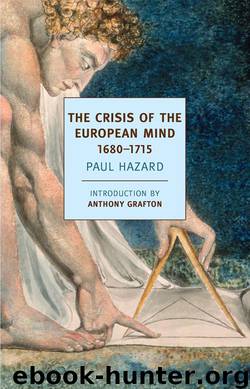The Crisis of the European Mind, 1680-1715 by Paul Hazard

Author:Paul Hazard
Language: eng
Format: azw3
Tags: Modern, Philosophy, 17th Century, General, 18th Century, History & Surveys, History
ISBN: 9781590176191
Publisher: NYRB Classics
Published: 2013-04-08T23:00:00+00:00
PART THREE
The Task of Reconstruction
I
LOCKE’S EMPIRICISM
So the great quest had to be started all over again; the human caravan must needs set forth once more, this time along a new road, and heading for a different goal.
To begin with, and most important of all, it must keep clear of Pyrrhonism, a thing which filled even Bayle himself with dread. To be continually arguing about everything under the sun, and then do no more than suspend judgment, means in the end complete inaction, the immobility of death. Pyrrhonism, a useful ally in restoring to the mind its freedom of choice, now looked as if it were going to annihilate the Will, and, with it, the possibility of choosing at all. This was no time for logic-chopping, for weighing the nicely calculated less or more, but for striking out promptly and resolutely for the far-off horizon of Happiness.
Fontenelle explained to his pupil, the marquise, one night when they were contemplating the stars together, that Philosophy was based on two things; one, that we had enquiring minds, the other, that we had very short sight. The result was that philosophers spent their time disbelieving what they did see, and trying to guess at what they didn’t; an impossible state of affairs. Far better do the exact opposite; not bother our heads about what we don’t see, but trust firmly to what we do. A philosophy that answered both these needs would be an immense boon to the human race. It would preserve them from doubt.
At this point it was that Locke came in.
And he came in the nick of time, like a bringer of good things, because he invested “the fact” with its due status and its sovereign dignity. In speaking of facts, we do not mean the facts of history. They had been shown up, discredited, done with. There was no going back on that; their fate had been sealed once for all. When one tried to bring to light the facts of history, facts engulfed in the dead, irrevocable past, they came wrenched from their context, misinterpreted, warped, and bestained with lies. No sensible people could put any trust in them. What was needed was a different sort of certitude from that, and it was John Locke who supplied it.
Locke it was who turned the attention of thinkers to psychological truths, truths present in the mind, living, constant and indefectible. In this domain, not only is reason, however doubting it may be, forced to accept some elementary data on which criticism has no hold, but, more than that, it delights to discover, what had hitherto been hidden from it, namely, the conditions of its own functioning. And so the rationalists accept an alliance which keeps them on the hither side of scepticism; the eighteenth century, in so far as it has its roots in the seventeenth, is rationalistic in essence and empirical by consent.
Locke seemed expressly designed to play the part of the ideal philosopher. In the first place, he was an Englishman; consequently he thought deeply about things.
Download
This site does not store any files on its server. We only index and link to content provided by other sites. Please contact the content providers to delete copyright contents if any and email us, we'll remove relevant links or contents immediately.
The remains of the day by Kazuo Ishiguro(7565)
Tools of Titans by Timothy Ferriss(6957)
The Black Swan by Nassim Nicholas Taleb(6201)
Inner Engineering: A Yogi's Guide to Joy by Sadhguru(5905)
Giovanni's Room by James Baldwin(5889)
The Way of Zen by Alan W. Watts(5808)
The Six Wives Of Henry VIII (WOMEN IN HISTORY) by Fraser Antonia(4797)
The Power of Now: A Guide to Spiritual Enlightenment by Eckhart Tolle(4762)
Astrophysics for People in a Hurry by Neil DeGrasse Tyson(4626)
Asking the Right Questions: A Guide to Critical Thinking by M. Neil Browne & Stuart M. Keeley(4591)
12 Rules for Life by Jordan B. Peterson(3742)
The Ethical Slut by Janet W. Hardy(3508)
Skin in the Game by Nassim Nicholas Taleb(3475)
Housekeeping by Marilynne Robinson(3407)
The Art of Happiness by The Dalai Lama(3389)
Double Down (Diary of a Wimpy Kid Book 11) by Jeff Kinney(3283)
Skin in the Game: Hidden Asymmetries in Daily Life by Nassim Nicholas Taleb(3270)
Walking by Henry David Thoreau(3236)
12 Rules for Life: An Antidote to Chaos by Jordan B. Peterson(3209)
